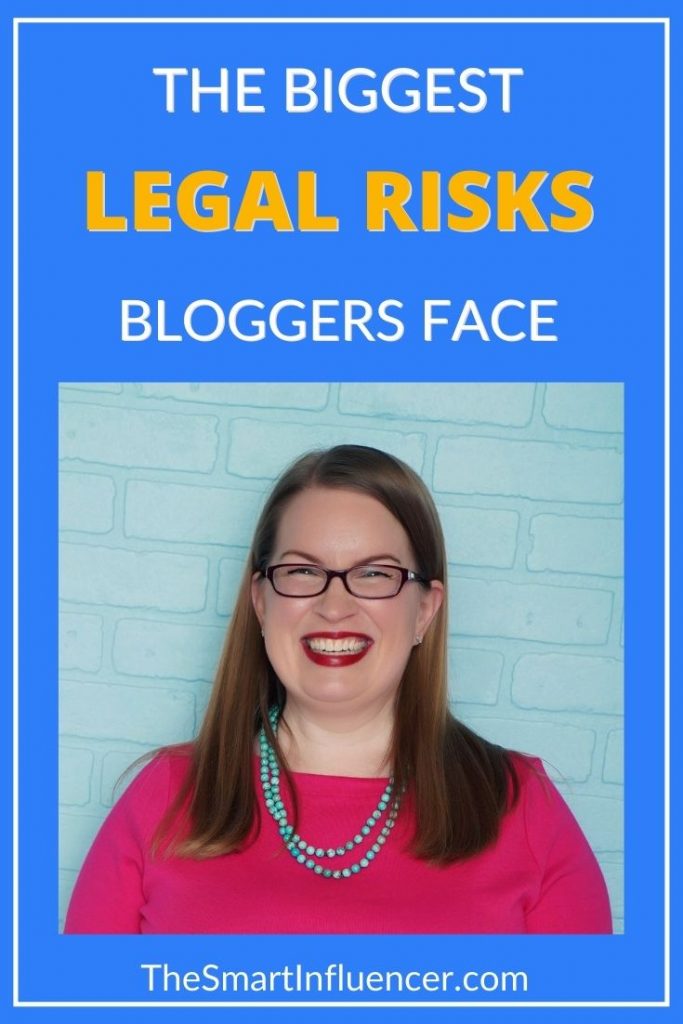The Biggest Legal Risks Bloggers Face
Have you ever wondered what legal risks are involved blogging? In this week’s episode, we speak with Danielle Liss about what legal risks bloggers and influencers may face and how to avoid them.

In this episode, I’m talking with Danielle Liss of Businessese and Liss Legal about the biggest legal risks that bloggers may face. If you are trying to protect your business and avoid legal risks, this episode has the answer.
Episode 041: The Biggest Legal Risks Bloggers Face
About Danielle Liss
Danielle is passionate about simplifying legal for small business owners. She is the founder and CEO of Businessese, which offers DIY legal templates. She is the owner of LISS Legal, where she focuses her practice on online business owners, bloggers & influencers, and wellness professionals. In early 2021, Danielle launched the Simplifying Legal for Small Business Owners podcast. In the past, she served as Chief Marketing Officer and General Counsel of an influencer network, as well as general counsel and vice president of affiliate programs for an 8-figure digital health and wellness company.
Website: Businessese and Liss Legal
Instagram: Instagram.com/Kittenagogo
Facebook: Facebook.com/legalsimplified & facebook.com/dsliss
What are the main areas as bloggers to be concerned about?
The legal aspects of blogging may seem intimidating due to lack of understanding. The main concerns an influencer may have can be broken down into four categories.
The categories are entity formation, contracts, website policies, and intellectual property. Two key parts of intellectual property that affect influencers are trademarks and copyrights.
What should be considered about entity formation?
It is important to understand the several types of entities that can be formed to decide which is right for you. There are sole proprietorships, corporations, and LLCs (Limited Liability Corporations.)
The most popular choice for bloggers is LLCs because they are easy for taxes and there is protection from liability. It can be easy to form an entity, but the cost can vary from location to location. It is important to weigh the benefits and impacts for your business before forming an entity. If you form multiple LLCs, you may want to consider consulting with a tax attorney.
Which types of contracts are most important for bloggers/influencers?
The importance of certain types of contracts is dependent on your revenue streams. Certain aspects of a contract may affect your income, so it is important to understand how they work. For sponsored content agreements, the most important aspects include deliverables, exclusivity, duration, and ownership of content.
Ownership of content means that you are the owner of the content as the creator. If the company you are working with would like ownership, they must state how the shift will occur. This may be stated as “work-for-hire,” “assign copyrights to brand,” or “retain ownership but provide a license.”
When dealing with contacts for team members, it is important to clearly state your expectations in writing. This should include payments, termination provision, a non-solicitation clause, and a clear statement of services.
What should an influencer consider about website policies?
Aspects of website policies include terms and conditions, privacy policies, and disclaimers. Terms and conditions can be understood as your contract with your audience about how they can interact with your website. This must be done clearly to avoid future issues. A privacy policy must be put in place if you are collecting information from your audience such as an IP address. Finally, disclaimers should be used when you are sharing information with your audience. This can help the audience to control their expectations and understand the purpose of your content.
What should an influencer consider about intellectual property?
There are two components to be considered for intellectual property. The first component is patents which includes inventions, so most bloggers do not deal with patents. There are also trademarks which represent your brand and stream of commerce (e.g., a logo).
People tend to confuse trademarks and copyrights, but they are different. A copyright suggests the media is fixed, so influencers have many things that are copyrighted because they have been published by you. In order to sue for breach of a copyright, the copyright must be registered. Most bloggers do not copyright everything, but it may be a good idea if a post of yours becomes very popular.
What’s Next
You can connect with Danielle Liss on Businessese.com
Review & Subscribe on Apple Podcasts
If you liked this episode, please consider rating and reviewing my show on Apple Podcasts or your favorite podcast app. As always, we’d love to know what you learned in today’s show – send us a DM on Instagram to let us know.

Add A Comment